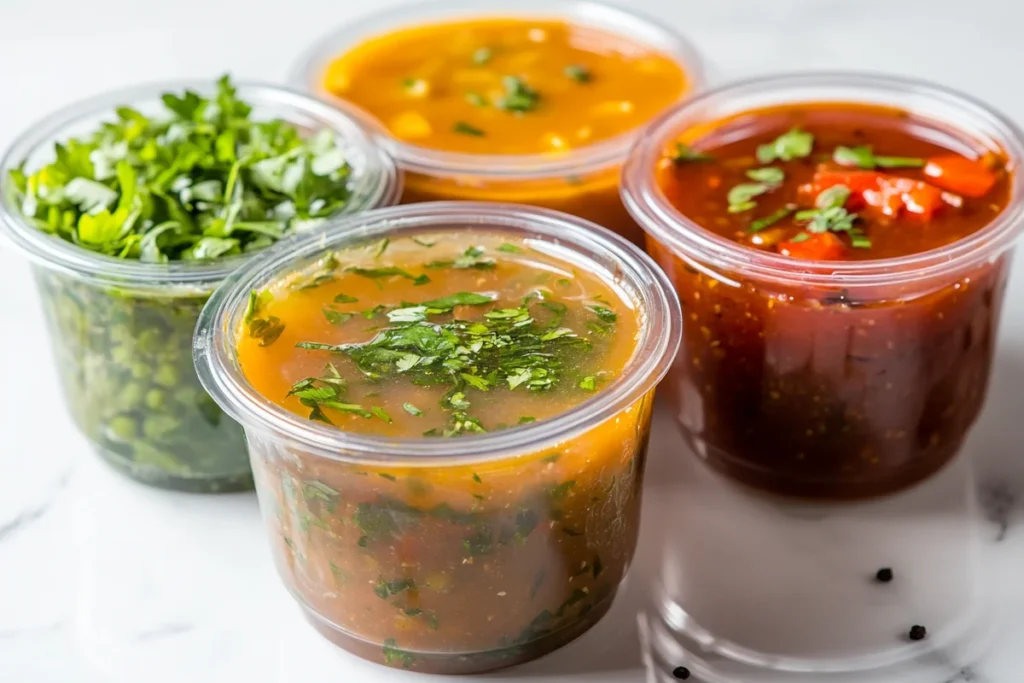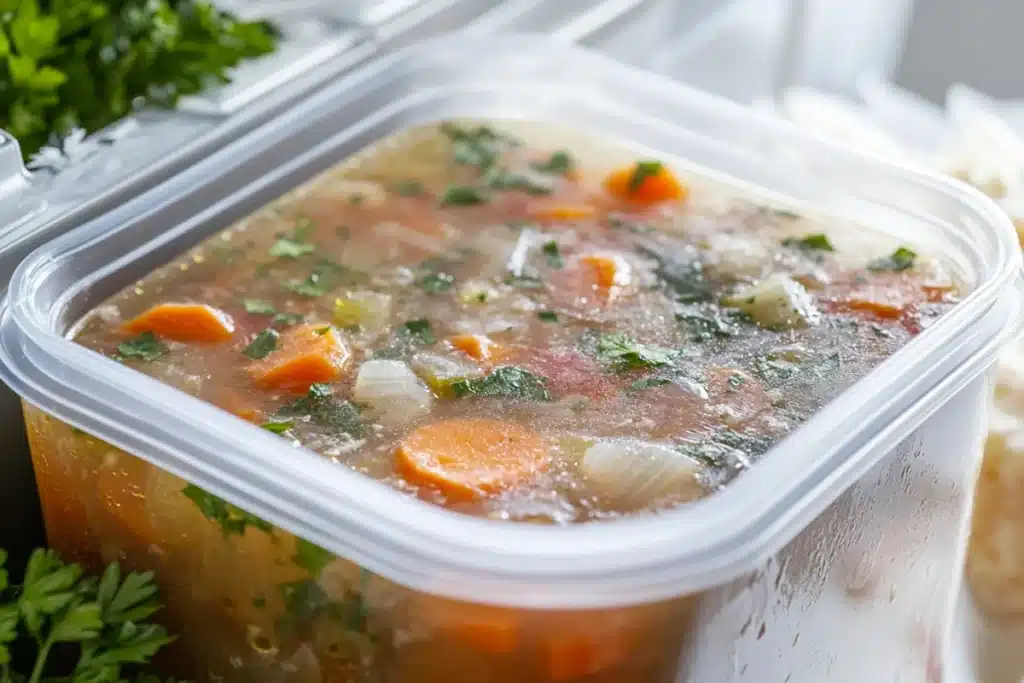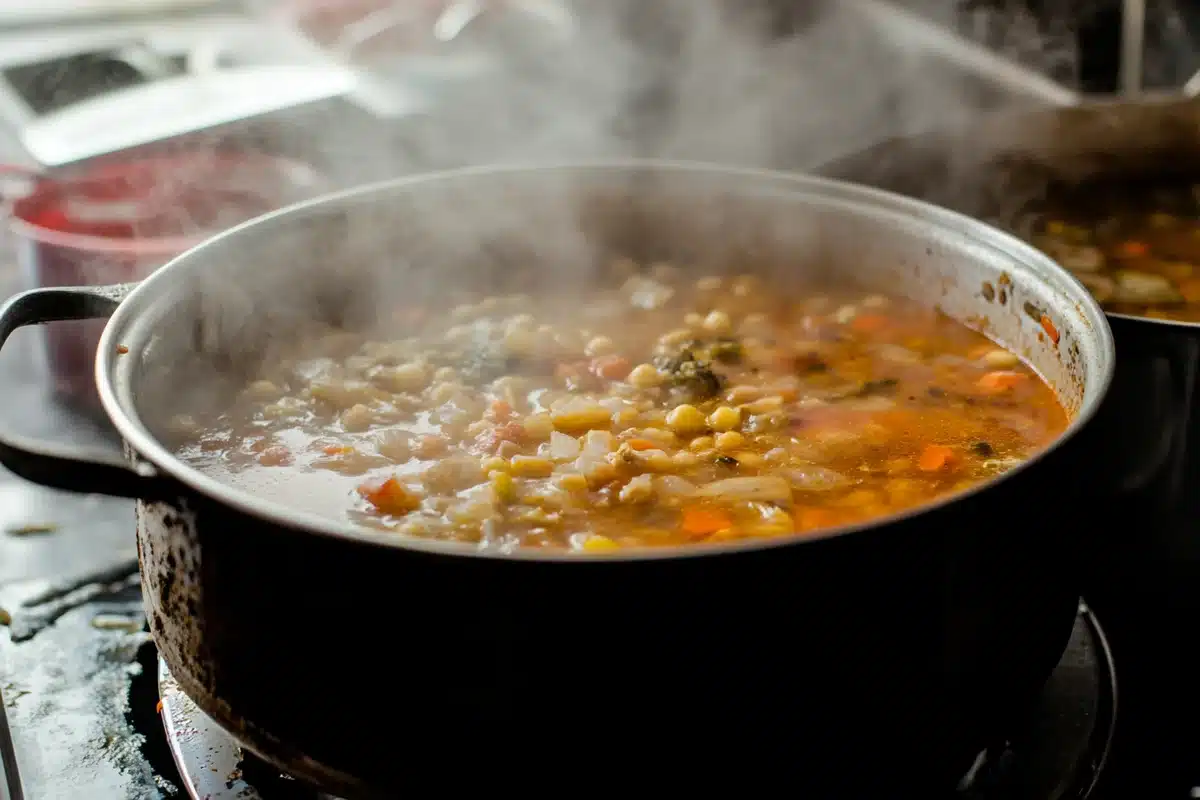Is soup still good after being in the fridge for six days? Many ask, “Is soup good after 6 days in fridge?” This article explores the safety and quality of soup stored for that long. It’s crucial to know when soup is still good to eat.
Storing soup properly is crucial for both its quality and safety. Many people enjoy making big batches of soup, but knowing how long it will stay good is very important. Therefore, understanding the guidelines for storing and eating soup will help keep everyone safe. Let’s look at how long soup can safely sit in the fridge. So, is soup good after 6 days in fridge? Let’s explore this.
How Long Does Soup Last in the Refrigerator?
Generally, most soups will stay good in the fridge for about three to four days. However, the exact time can be affected by the kind of soup and how it’s stored. Therefore, paying attention to how you handle soup is very important. For example, soup that has been made with fresh ingredients might have a slightly shorter time than those made with simple broths. Additionally, soup with cream or milk might not last as long as a plain broth based soup. Thus, keep an eye on the details of how long the soup was in the fridge. When considering is soup good after 6 days in fridge, remember these factors.
Understanding Different Types of Soup Storage
The kind of soup you have also matters when thinking about storage time. Broth-based soups usually keep good for a longer time compared to soups with dairy or lots of vegetables. For example, tomato soup or chicken noodle soup often last longer than creamy soups like potato or broccoli soup. Accordingly, it’s always good to keep these differences in mind when planning your meals and storing leftovers. Furthermore, lentil soup, another common broth-based option, also tends to store well because of its relatively low moisture content, which helps in deterring bacterial growth. Thus, different types of soups need different storage times for best results. Knowing this can help you determine if your soup is good after 6 days in fridge.
Proper Storage Techniques for Soup
How you store your soup is another factor that affects how long it stays good. First, make sure to put the soup in the refrigerator within two hours of cooking. Also, place it in shallow containers for faster cooling. Subsequently, this helps prevent the soup from sitting too long at room temperature where bacteria can grow. Finally, storing it in an airtight container helps keep its quality and prevents contamination from other items in the fridge. Moreover, dividing soup into smaller portions can also aid in faster cooling. Likewise, this is a useful method when dealing with larger batches of soup. Additionally, it ensures each portion cools quickly and safely. Proper storage will also make it more likely the soup is good after 6 days in fridge, if it can be.

Checking If Soup is Still Good After 6 Days
After six days, you should check the soup carefully before eating. Generally, most soup isn’t good after that many days. However, if you decide to taste it, be sure you look for signs of spoilage. Therefore, if the soup shows any of the signs below, do not eat it. Specifically, always prioritize food safety above all else. Indeed, being careful about consuming soup that has been stored for a while is key to your safety. Thus, awareness is key when deciding whether or not to eat the soup. Asking, “is soup good after 6 days in fridge,” requires careful consideration.
Signs of Spoilage in Soup
Soup that has gone bad will often have several obvious signs. First, look for a change in color or texture. Specifically, if the soup appears slimy or has mold, it’s not good. Also, if the soup smells sour or otherwise bad, it’s a clear sign that it has spoiled. Indeed, never eat soup that has any of these warning signs. Furthermore, the presence of bubbles, a film on the top, or an unusual thickness can also suggest spoilage. Therefore, a variety of visual and textural clues help identify soup that is not good. Additionally, if you see anything unusual, it’s best to avoid eating it. So, before you ask “is soup good after 6 days in fridge“, check for these.
The Smell and Taste Test
The smell test is the next important way to tell if your soup is safe to eat. If the soup smells off or acidic, it is most likely bad. Likewise, a sour or unusually bad smell is a key indicator that you should discard the soup. Additionally, a tiny taste can also tell you if the soup is still good. However, only taste a tiny bit. Finally, if it doesn’t taste right, throw it out. Indeed, the combination of smell and a tiny taste can be a very effective way to check a soup‘s quality. Moreover, if in doubt, it’s always best to be on the safe side and dispose of the soup. Thus, taking these simple steps can prevent food borne illness. This helps ensure if your soup is good after 6 days in fridge.
Can Soup Be Frozen to Last Longer?
Freezing soup is a good way to make it last longer. Most soups can be frozen for up to three months without major quality changes. Therefore, if you know that you won’t eat the soup within the recommended time in the fridge, freezing is a better option. Moreover, you can then have soup whenever you want. Thus, freezing soup reduces food waste and provides convenient meals. Specifically, it allows you to enjoy your favorite soups at your convenience. In addition, freezing is useful for meal prepping. Accordingly, if you plan to prepare large batches of soup, freezing can help make the process more efficient. If your goal is to avoid the question, “is soup good after 6 days in fridge?”, consider freezing.

Best Practices for Freezing Soup
When freezing soup, it’s essential to use freezer-safe containers or bags. Also, remember to leave some room in the container since liquids expand when frozen. Furthermore, cooling the soup before freezing can reduce ice crystals. Then, label the containers with the soup type and the date you froze it for easier access. In addition, properly labeling helps keep your freezer organized. Additionally, it helps ensure that you use the soup within the suggested timeframe. Moreover, consider using a marker that is specifically for freezer use as the ink will not run, smear or fade. Thus, labeling and dating are useful habits to develop. This is particularly helpful for when you are wondering if the soup is good after 6 days in fridge if not frozen immediately.
Reheating Frozen Soup
To reheat frozen soup, thaw it in the fridge overnight, if possible. However, you can also reheat it directly from frozen on the stovetop or in a microwave. Subsequently, ensure the soup reaches a temperature of 165°F to kill any bacteria. Finally, be sure to stir soup well while reheating for even heating and a more consistent temperature. Indeed, making sure your soup is fully reheated is crucial to food safety. Furthermore, reheating slowly can also help the soup maintain its texture and quality. Thus, using these suggestions will allow you to enjoy your frozen soup safely. Even after freezing, it’s important to make sure the soup is good before consuming.
Factors Influencing Soup Shelf Life
Several factors influence how long soup stays good, other than storage time and method. For example, the initial quality of the ingredients and how well the soup was cooked play important roles. Furthermore, understanding these aspects will ensure the maximum storage time for your soup. Therefore, understanding what influences the soup shelf life will help extend its good storage time. Specifically, taking note of these factors will help maximize the length of time that your soup can be stored. Indeed, being aware of these points can make a big difference in your meal planning process. Thus, knowing these factors is vital to enjoying a great soup.
Ingredient Quality and Freshness
The freshness of ingredients affects how long the soup will last in the fridge. Specifically, soup made with fresh, high-quality ingredients will usually keep better than soup made with older ingredients. Therefore, using good–quality items means longer safe storage time. Moreover, fresh ingredients lead to better flavor and are safe for consumption for a longer time. In addition, using fresh, good ingredients results in better soup overall. Furthermore, the presence of any damaged or overripe items can actually reduce the shelf life of the entire batch of soup. Thus, it is always a good idea to only use the freshest items.
The Cooking Process
How well you cook the soup matters greatly. If the soup isn’t heated properly during cooking, it might not kill all bacteria. Additionally, cooking soup fully will also increase the time that the soup will stay good when stored in the refrigerator. Therefore, always ensure soup is cooked thoroughly to help prevent the growth of bacteria. Also, be sure the internal temperature reaches the recommended heat for safety. Moreover, using a cooking thermometer is one way to ensure the soup reaches the appropriate temperature. Thus, ensuring your soup is properly cooked is a key factor in its storage time and safety. Specifically, undercooking soup can increase the risk of foodborne illnesses.
The Role of Dairy in Soup Shelf Life
Soup containing dairy tends to spoil quicker. For example, cream, milk, or cheese in soup can make it last less time. Accordingly, creamy soups like chowder or cream of tomato soup should be consumed faster. Therefore, these soups need to be eaten within 3 days, or even sooner depending on the dairy content. Furthermore, be especially mindful of these soups to prevent any food safety issues. Specifically, pay close attention to the smell and texture before eating creamy soups after a few days in the fridge. In addition, it can be useful to note when you add dairy as this will affect the storage timeline of the soup. Thus, a simple step in the cooking process can help improve the quality of the stored soup.
Food Safety Tips for Storing Soup
Storing soup correctly is important to avoid food poisoning. Thus, following food safety best practices will help ensure that your soup is safe. Moreover, these practices will keep both you and your loved ones healthy and happy. Indeed, food safety is key to avoiding illnesses. Therefore, learn and use these simple tips to keep your soup good and safe. Additionally, if you are storing soup for someone who is ill or has weakened immunity, extra care is needed to make sure the soup is safe. Thus, being aware of these tips is good for everyone’s health.
Cooling Soup Quickly
Allow soup to cool down quickly before refrigerating it. For instance, you can put it in shallow containers so that it will cool faster. Also, do not let soup stay at room temperature for more than two hours. Specifically, cooling it fast will prevent the growth of harmful bacteria. Consequently, reducing the time the soup is in the temperature danger zone will help keep it safe. Furthermore, you can also put the soup container in an ice bath to lower the temperature even quicker. Thus, cooling soup as quickly as possible is essential for its safety. In addition, the faster cooling also helps in preventing the soup from losing its quality due to sitting at room temperature.
Using Proper Containers
Store your soup in airtight containers. Additionally, make sure the container is clean before you add the soup. Furthermore, the right container also helps prevent odors and flavors of other food in the fridge from affecting your soup. Specifically, always use appropriate food grade containers. Therefore, proper containers will help the soup stay fresh and safe for a longer time. Moreover, using glass containers can often reduce the risk of odors and stains. Thus, choosing the correct container is important for the storage of your soup. In addition, consider containers that are both microwave and freezer safe to make reheating easier.
Avoiding Cross-Contamination
Never use the same utensils for raw and cooked food. Therefore, you need to wash any utensils that came into contact with raw food thoroughly before using them for soup. Also, store the soup away from other raw food items to avoid any contamination. Consequently, this will ensure the soup remains good and safe to eat for an extended time. Thus, cross-contamination can easily be avoided by using a little extra care. Specifically, cross-contamination can introduce harmful bacteria that can grow and make soup unsafe to eat. In addition, consider using different colored cutting boards for raw and cooked food to further reduce any possible contamination. Moreover, awareness of cross-contamination is an important part of food safety.
Additional Tips for Maximizing Soup Quality and Safety
Beyond basic storage, several other things can help keep your soup good and safe. For example, think about the type of broth you use and when to add fresh herbs. Additionally, consider how often you open the refrigerator. Furthermore, these extra steps can help maintain both the quality and the longevity of your soup. Therefore, using these tips will ensure your soup is both safe and enjoyable. Thus, taking these additional measures can help improve the overall quality of the soup.
Choosing the Right Broth
The broth you use in your soup can impact its overall quality and shelf life. Broths made with fresh ingredients or homemade stocks tend to have a shorter shelf life than commercially prepared ones. However, homemade broth usually has a better flavor and is typically healthier. Therefore, if you choose to use homemade stock in your soup, it is vital to note that it may reduce the time the soup can be stored safely. Additionally, make sure your broth is also stored properly. Thus, choosing the right broth is key to a good soup.
Timing of Fresh Herb Additions
Adding fresh herbs can make your soup more flavorful. However, they can also reduce its storage life. Fresh herbs tend to deteriorate more quickly when stored in liquid. Therefore, adding them right before serving can help maintain the soup‘s overall quality. Furthermore, you can add dried herbs when cooking, as they often do not affect the storage life of soup. Thus, it’s best to think about when you add these ingredients. Specifically, this will help ensure the flavor remains fresh, and does not decrease the quality of the soup.
Limiting Refrigerator Door Openings
Try to limit how often you open your refrigerator. Every time you open it, the internal temperature can fluctuate, which can make it harder to keep your food at the right temperature. Additionally, this fluctuation can reduce the quality of any soup that is stored inside. Therefore, limiting the number of openings will help keep your soup fresh. Furthermore, it will also save on energy consumption, which is a benefit for both you and the environment. Thus, minimizing refrigerator openings is a small but effective step. Specifically, doing this will help keep your soup at the correct temperature for storage.
Conclusion
In conclusion, while soup can often stay good for three to four days in the fridge, six days is often pushing it. Always check for signs of spoilage, such as bad smell, changes in color or texture before eating. However, freezing is a good way to make soup last longer. Therefore, following these simple food safety rules, you can enjoy your soup and stay safe. Additionally, understanding the science behind the soup shelf-life will empower you to make safer food choices. Thus, being aware of these tips is the key to safely enjoying your soup. Specifically, with a little care, you can safely enjoy your soup for a longer time.
Frequently Asked Questions (FAQs):
Can I eat 6 day old soup?
Generally, it is not recommended to eat six-day-old soup. While some soups might still be good, there is a higher risk of spoilage and foodborne illness. It’s best to check for signs of spoilage.
Can you leave soup in the fridge for a week?
Leaving soup in the fridge for a week is generally not advisable. The recommended storage time for most soups is three to four days. After that, the risk of bacteria growth increases significantly.
Can I eat soup that was made 5 days ago?
Eating soup that was made five days ago is also risky. Though it may not be obviously spoiled, it’s near the limit of safe storage time. It is crucial to inspect and smell the soup before eating it. If there is any question, it’s safer to discard the soup.

